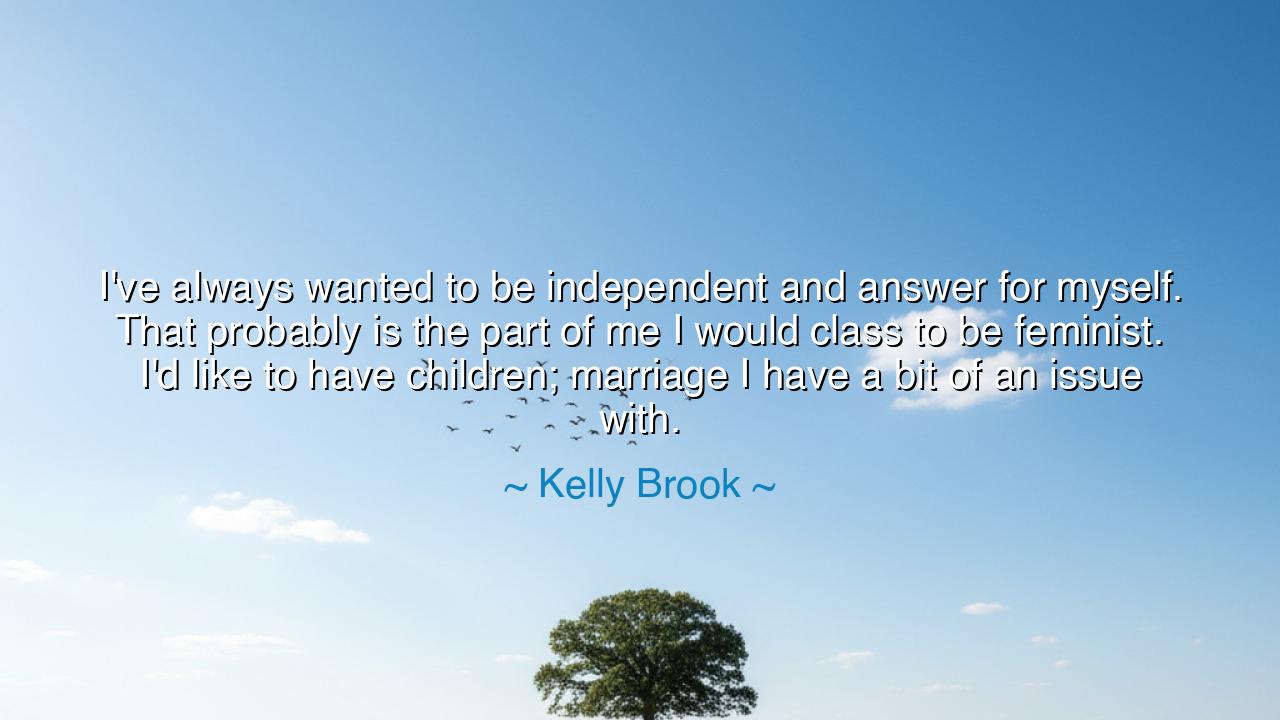
I've always wanted to be independent and answer for myself. That
I've always wanted to be independent and answer for myself. That probably is the part of me I would class to be feminist. I'd like to have children; marriage I have a bit of an issue with.






"I've always wanted to be independent and answer for myself. That probably is the part of me I would class to be feminist. I'd like to have children; marriage I have a bit of an issue with." These words, spoken by Kelly Brook, carry with them a profound expression of individualism and empowerment. In a world where the expectations placed upon women are many and varied, Brook’s declaration calls us to consider the meaning of true independence—the kind that seeks not to conform to societal expectations, but to carve out one’s own path, answerable only to oneself. Her words reflect the desire for autonomy, the yearning to chart a course that feels true to one’s spirit, and the wisdom to question societal norms that might limit or restrict the soul’s full expression.
From the earliest times, the idea of independence has been held in high esteem. The ancient Greeks, for example, celebrated the virtuous life, a life lived according to one’s own principles and free from the constraints of external demands. Socrates, that noble philosopher, once said that the unexamined life is not worth living. In this, he was calling for individuals to stand firm in their truth, to seek not only knowledge but freedom from the chains of conformity. To be independent, in the eyes of the ancients, was not to turn away from the world, but to engage with it on one’s own terms, to answer for oneself and to live authentically.
Brook’s desire for independence echoes this ancient wisdom. To answer for oneself is to take responsibility for one’s own actions, to be the master of one’s fate, and to not seek validation from outside sources. It is the declaration that the life one lives is one’s own, and no one else’s. This is the heart of feminism, a movement that seeks to empower women not only to choose freely their roles in society, but to demand that they be treated with respect and equality, regardless of what choices they make. Feminism is not simply a desire for equality in the workplace or in politics; it is a call for personal autonomy, for the right to shape one’s life according to one’s own desires and ambitions.
However, Brook also speaks of marriage, a union that has been revered as a cornerstone of societal stability for millennia. And yet, she admits a certain discomfort with it. She speaks not with disdain but with caution, acknowledging that the idea of marriage does not fit neatly into her vision of independence. Historically, marriage has often been seen as a transaction, a bond that ties one individual to another in ways that can limit freedom and self-determination. For many women throughout history, marriage was not a choice but an expectation—something imposed upon them, rather than a union of equals. In this sense, Brook's hesitation is rooted in a long tradition of women who have had to fight for their right to define their own roles in the world.
We might look to the example of Elizabeth I, Queen of England, who famously chose to remain unmarried, despite the tremendous pressure to do otherwise. Her decision to remain independent and focus on her reign was a radical one in an age where women were expected to marry for political and personal stability. Elizabeth’s decision was not one of avoidance but of empowerment—she chose to remain her own ruler, to answer to no one but herself. In this, she became a symbol of strength and autonomy, proving that independence need not be tied to societal norms.
And yet, Brook also expresses a desire to have children, a natural and deeply human longing. This, too, speaks to the complexity of independence. To desire children is not to renounce freedom, but to choose a path that is rich with responsibility, love, and connection. It is to embrace life’s most profound responsibilities with an open heart. Motherhood does not diminish independence; it elevates it, giving the individual a deeper connection to the world around them. It is an act of choice, an act of creation, one that requires strength and resilience, qualities that come from a deep understanding of self.
Thus, the lesson to be drawn from Kelly Brook’s words is one of balance—independence and responsibility, freedom and commitment. Marriage may not be a path that every individual must follow, but parenthood, like any life choice, should be embraced with the same understanding of autonomy and self-determination. Let us not fall into the trap of seeing certain roles as limiting or others as freeing. Instead, let us embrace the wisdom of the ancients who understood that the key to a full and meaningful life is choice—the freedom to choose, the courage to decide, and the strength to answer for oneself.
May we, in our own lives, take the lessons of independence and feminism to heart. Let us embrace the path that feels true to us, whether it leads to marriage, parenthood, or something entirely different. And let us remember that true empowerment lies not in the roles we are given, but in the roles we choose to create for ourselves. Let us choose with wisdom, with love, and with a deep respect for the autonomy of those around us, knowing that in our choices, we shape not only our lives but the world we leave behind.






AAdministratorAdministrator
Welcome, honored guests. Please leave a comment, we will respond soon